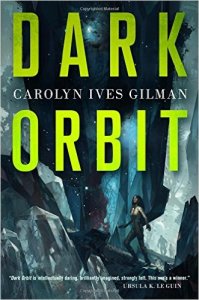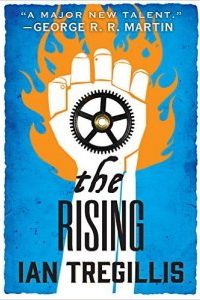Karen Burnham reviews Carolyn Ives Gilman
Dark Orbit, Carolyn Ives Gilman (Tor 978-0-7653-3629-3, $25.99, 304pp, hc) July 2015. Dark Orbit is the most recent entry in Carolyn Ives Gilman’s Twenty Planets setting, which also hosted her Nebula Award-nominated novellas ‘‘Arkfall’’ and ‘‘The Ice Owl’’. In this future people can choose to send themselves to distant planets by beaming their information at light speed around the galaxy, then being reconstituted teleporter-style on the other side. Slower than light robotic probes fan out across space to search for interesting planets, although most of these seem to have been colonized by humans in an earlier diaspora that has been lost to our knowledge. When the probes find something interesting, a team of people can beam themselves aboard the spaceship and investigate more closely. After waking up on Capella Two and discovering that she has suffered quite a reversal of fortune during her five year light-speed transit, Sara is asked by her old mentor to join such an expedition 58 light-years away. Sara is already comfortable being out-of-synch with other, planet-bound humans (travelers deride them as Plants), but this mission has political overtones that make her wary.
Dark Orbit is the most recent entry in Carolyn Ives Gilman’s Twenty Planets setting, which also hosted her Nebula Award-nominated novellas ‘‘Arkfall’’ and ‘‘The Ice Owl’’. In this future people can choose to send themselves to distant planets by beaming their information at light speed around the galaxy, then being reconstituted teleporter-style on the other side. Slower than light robotic probes fan out across space to search for interesting planets, although most of these seem to have been colonized by humans in an earlier diaspora that has been lost to our knowledge. When the probes find something interesting, a team of people can beam themselves aboard the spaceship and investigate more closely. After waking up on Capella Two and discovering that she has suffered quite a reversal of fortune during her five year light-speed transit, Sara is asked by her old mentor to join such an expedition 58 light-years away. Sara is already comfortable being out-of-synch with other, planet-bound humans (travelers deride them as Plants), but this mission has political overtones that make her wary.
Sara finds herself orbiting the planet Iris, which has fascinating gravitational anomalies, in a spaceship that seems to have been designed by MC Escher. Her official role is to observe the dynamics of the corporate-sponsored research team, and her real agenda is to observe her mentor’s young relative, Thora Lassiter, who suffered a mental breakdown during a previous diplomatic mission and has probably been sent to Iris to get her out of the way. We also get Thora’s perspective on things from entries in her audio journal, and her sections have a beautifully different voice which reminds us that Gilman knows her craft, as well as how to tell stories.
All of the careful machinations Sara expects get quickly thrown out the window, first by an apparent murder on board, and next when it turns out that Iris has possibly non-human-origin life on it, and finally when it turns out that there are human inhabitants living underground in lightless and mysterious circumstances. Thora goes missing, and Sara has to work with some of her fellow travelers and around the more useless and paranoid corporate agents to try to wrest something positive out of this wholly unexpected and rocky first-contact scenario. In Thora’s sections we see her interact with the Irisians, and watch her try to adapt to their circumstances while also dealing with memories dredged up about her previous breakdown.
Dark Orbit raises many, many more interesting questions than it has time to interrogate and resolve. In many ways it ends just as things are really getting complicated, although all the immediate plot crises are neatly wrapped up in the final pages. It leaves itself almost demanding a sequel, as the things learned by Sara and the corporate team have the potential to shake up everything about their galactic society as it has developed to this point. There are questions about gravity, consciousness, observation, first contact, colonialism, and informed consent that all beg for deeper discussion.
In many ways this feels like a very old-fashioned kind of SF story. While the characters can beam themselves as information streams across light years of space and use quantum entanglement to instantaneously communicate with other worlds, they don’t appear to have e-mail, cell phones, or GPS even on the developed worlds. When the ship goes into lockdown during the murder investigation, communication is by loudspeaker, and the characters stuck in different parts of the ship seem to have no way to communicate with each other until lockdown is lifted. However, that pre-Internet mindset is more than offset by the big questions raised by the narrative. Gilman is sophisticated in her development of both the sociological and physical implications and complications raised by the contact between the research team and the planet’s humans, echoed and complicated by the unfolding story of how Thora’s previous diplomatic mission went wrong. How Gilman will handle the rippling consequences of these discoveries and interactions remains to be seen.




